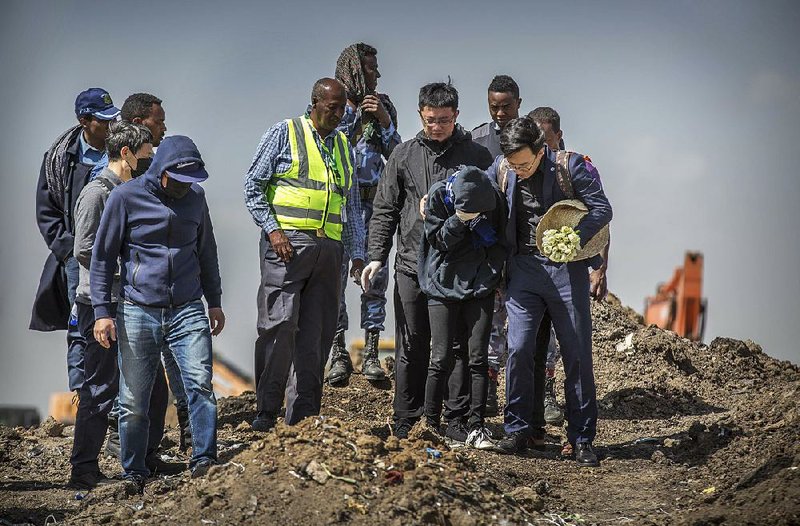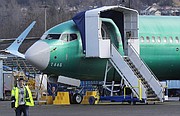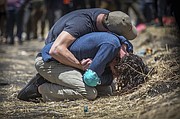WASHINGTON -- The Federal Aviation Administration issued an emergency order Wednesday grounding all Boeing 737 Max aircraft in the wake of a crash of an Ethiopian airliner that killed 157 people, a reversal for the U.S. after federal aviation regulators had maintained that they had no data to show the jets are unsafe.
The decision came hours after Canada joined some 40 other countries in barring the Max 8 from its airspace, saying satellite tracking data showed possible but unproven similarities between the Ethiopian Airlines crash and a previous crash involving the same model of jet five months ago. The U.S. also grounded a larger version of the plane, the Max 9.
Daniel Elwell, acting head of the FAA, said enhanced satellite images and new evidence gathered on the ground led his agency to order the jets out of the air.
The data, he said, linked the behavior and flight path of the Ethiopian Airlines Max 8 to data from the crash of a Lion Air jet that plunged into the Java Sea and killed 189 people in October.
"Evidence we found on the ground made it even more likely that the flight path was very close to Lion Air's," Elwell told reporters in a conference call Wednesday.
Satellite data right after the crash weren't refined enough to give the FAA what it needed to make the decision to ground planes, Elwell said. But on Wednesday, global air traffic surveillance company Aireon and Boeing were able to enhance the initial data to make it more precise "to create a description of the flight that made it similar enough to Lion Air," Elwell said.
The Ethiopian plane's flight data and voice recorders will be sent to France for analysis, Elwell said. Some aviation experts have warned that finding answers in the crash could take months.
In a preliminary report on the Oct. 29 Lion Air crash, a device known as an "angle of attack" sensor mistakenly indicated that the plane's nose was too high, prompting the plane's automation software to push the plane downward. The Lion Air pilots fought to raise the plane's nose but were unable to stop the plane from crashing into the Java Sea.
President Donald Trump, who announced the grounding, was briefed Wednesday on new developments in the investigation by Elwell and Transportation Secretary Elaine Chao, and they determined that the planes should be grounded, the White House said.
Trump said the decision to ground the aircraft "didn't have to be made, but we thought it was the right decision."
He spoke afterward with Boeing CEO Dennis Muilenburg, and Boeing signed on.
"At the end of the day, it is a decision that has the full support of the secretary, the president and the FAA as an agency," Elwell said.
Airlines -- mainly Southwest, American and United -- should be able to swap out planes pretty quickly, and passengers shouldn't be terribly inconvenienced, said Paul Hudson, president of flyersrights.org, which represents passengers. The Max, he said, makes up only a small percentage of the U.S. passenger jet fleet, he said.
"I think any disruptions will be very minor," he said. "The first quarter of the year is the slow quarter, generally, for air travel," adding that the airlines have planes on the ground that aren't being used on trans-Atlantic flights that could be diverted to domestic routes.
Boeing issued a statement saying it supported the FAA's decision even though it "continues to have full confidence in the safety of the 737 Max." The company also said it had itself recommended the suspension of the Max fleet after consultations with the FAA and the National Transportation Safety Board.
"We are supporting this proactive step out of an abundance of caution," Boeing said.
WORKHORSE OF AIRLINES
The 737 class is a workhorse for airlines worldwide, and the single-aisle 737 Max has been Boeing's best-selling plane ever. More than 340 of the Max 8 planes are registered.
An estimated 8,600 flights use the plane in a typical week of travel, according to an analysis based on data from Flightradar24, a flight tracking service. But the model accounts for a small fraction of planes in the air at any given time, according to Ian Petchenik, a spokesman for Flightradar24.
The most popular routes are in North America and China.
The groundings will have a far-reaching financial impact on Boeing, at least in the short term, said John Cox, a veteran pilot and CEO of Safety Operating Systems.
In addition to those that have already been grounded, there are more than 4,600 Boeing 737 Max 8 planes on backlog that are not yet delivered to airlines.
"There are delivery dates that aren't being met, there's usage of the aircraft that's not being met, and all the supply chain things that Boeing so carefully crafted," Cox said. "If they can't deliver the airplanes, where do they put the extra engines and the extra fuselage and the extra electrical components?"
Even so, Cox thinks Boeing will recover because the planes typically fly for 30 to 40 years, and any needed fix will be made quickly, he said.
Boeing's shares have plummeted almost 11 percent since Sunday's Ethiopian Airlines crash. On Wednesday, the stock sank to $363.36 after the FAA announcement but then recovered to close at $377.14, up 0.5 percent for the day. It rose slightly in after-hours trading.
In making the decision to ground the Max 8s in Canada, Transport Minister Marc Garneau said a comparison of vertical fluctuations found a "similar profile" between the Ethiopian Airlines crash and the Lion Air crash. Garneau, a former astronaut who flew in the space shuttle, emphasized that the data are not conclusive but crossed a threshold that prompted Canada to bar the Max 8.
"This is not the proof that is the same root problem," he said. "It could be something else."
Canada lost 18 of its citizens in Sunday's crash, the second-highest number after Kenya. A Canadian family of six was among the dead.
Lebanon and Kosovo also barred the Boeing 737 Max 8 from their airspace Wednesday, and Norwegian Air Shuttles said it would seek compensation from Boeing after grounding its fleet. Egypt banned the operation of the aircraft. Thailand ordered budget airline Thai Lion Air to suspend flying the planes until after risk assessments. Lion Air confirmed reports that it has put on hold the scheduled delivery of four of the jets.
Ethiopian Airlines, widely seen as Africa's best-managed airline, grounded its remaining four models.
The growing number of countries joining the ban put the FAA in a difficult position, said Peter Goelz, a former managing director of the National Transportation Safety Board who is now an aviation consultant. He said the FAA, which certified the 737 Max as airworthy and has been the lead regulatory body for the airplane, prides itself on making data-driven decisions not based on "anecdotes or political pressures."
Goelz said Trump likely was feeling pressure from Congress and the public to step in.
"There's probably nobody in the administration who's got more of a sensitive ear to cable television," said Goelz.
The FAA is also certain to be looking into anonymous reports from pilots of at least two U.S. flights who wrote about problems last year in a NASA database, Goelz said.
The pilots reported that an automated system seemed to cause their Boeing 737 Max 8 planes to tilt down suddenly. The pilots said that soon after engaging the autopilot, the nose tilted down sharply. In both cases, they recovered quickly after disconnecting the autopilot.
After Trump's announcement, American Airlines said its "teams will make every effort to rebook customers as quickly as possible."
United Airlines, which grounded its 14 Max planes, said the aircraft accounts for roughly 40 flights per day. Through a combination of spare aircraft and rebooking customers, the airline did not anticipate a significant operational impact from Wednesday's decision.
Southwest Airlines said it immediately complied with the order and removed its 34 Max 8s from scheduled service. The airline said the Max 8 planes account for less than 5 percent of the airline's daily flights, adding that it remains confident in the airliner after completing more than 88,000 flight hours over 41,000 flights, but that it supports the FAA's decision.
Information for this article was contributed by Zeke Miller, Rob Gillies, Elias Meseret, Yidnek Kirubel, Tom Krisher, Cathy Bussewitz, Alexandra Olson, Deb Riechmann and Kevin Freking of The Associated Press; by Luz Lazo, Michael Laris, Lori Aratani, Aaron Gregg, Damian Paletta, Paul Schemm and Felicia Sonmez of The Washington Post; and by Denise Lu, Allison McCann, Jin Wu and K.K. Rebecca Lai of The New York Times.
A Section on 03/14/2019



